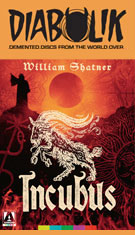
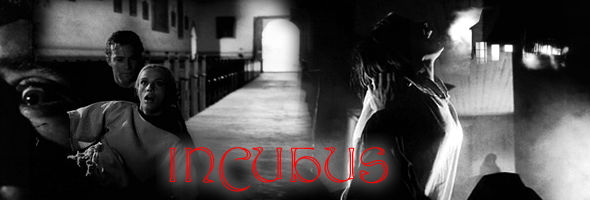
B&W, 1966, 74 mins. 9 secs.
Directed by Leslie Stevens
Starring William Shatner, Allyson Ames, Ann Atmar, Robert Fortier, Milos Milos
Arrow Video (UHD & Blu-ray) (US/UK RA/RB 4K/HD), Le Chat Qui Fume (UHD & Blu-ray) (France R0 HD/PAL), Fox Lorber (DVD) (US R1 NTSC)
While the idea of William  Shatner acting in the unsuccessful, fabricated "international" language of Esperanto sounds like the makings of a kitsch
Shatner acting in the unsuccessful, fabricated "international" language of Esperanto sounds like the makings of a kitsch  classic, Incubus is really anything but. This pet project of Outer Limits producer Leslie Stevens was rarely seen during its release and appeared to vanish entirely, existing more as a whispered about curio than a genuine film. The result, a sort of mythological mishmash of Horror Hotel and The Seventh Seal, is a strange and compelling experience that demands both imagination and patience from its viewers.
classic, Incubus is really anything but. This pet project of Outer Limits producer Leslie Stevens was rarely seen during its release and appeared to vanish entirely, existing more as a whispered about curio than a genuine film. The result, a sort of mythological mishmash of Horror Hotel and The Seventh Seal, is a strange and compelling experience that demands both imagination and patience from its viewers.
The pared-down storyline, set in a vaguely identified pastoral netherworld known as Nomen Tuum, follows the spiritual battle for the soul of Marc (Shatner), a former soldier who has settled into a quiet domestic life with his innocent sister, Arndis (Atmar). An alluring blonde succubus named Kia (Ames) appears to seduce the inherently virtuous Marc, but when she falls in love with him, a diabolical incubus (the ill-fated Milos Milos) arrives to even the score.
Though less than satisfying as a horror film per se, Incubus works as an attempt to create an art film out of purely California-bred film talent. The Big Sur locations are magically transformed into a dreamy, disorienting alternate universe, while the supernatural is firmly grounded in poetic visuals based in nature. Shatner is restrained and  sympathetic, with his usual scenery chewing inclinations held firmly in check here. Outer Limits fans in particular will enjoy contributions
sympathetic, with his usual scenery chewing inclinations held firmly in check here. Outer Limits fans in particular will enjoy contributions 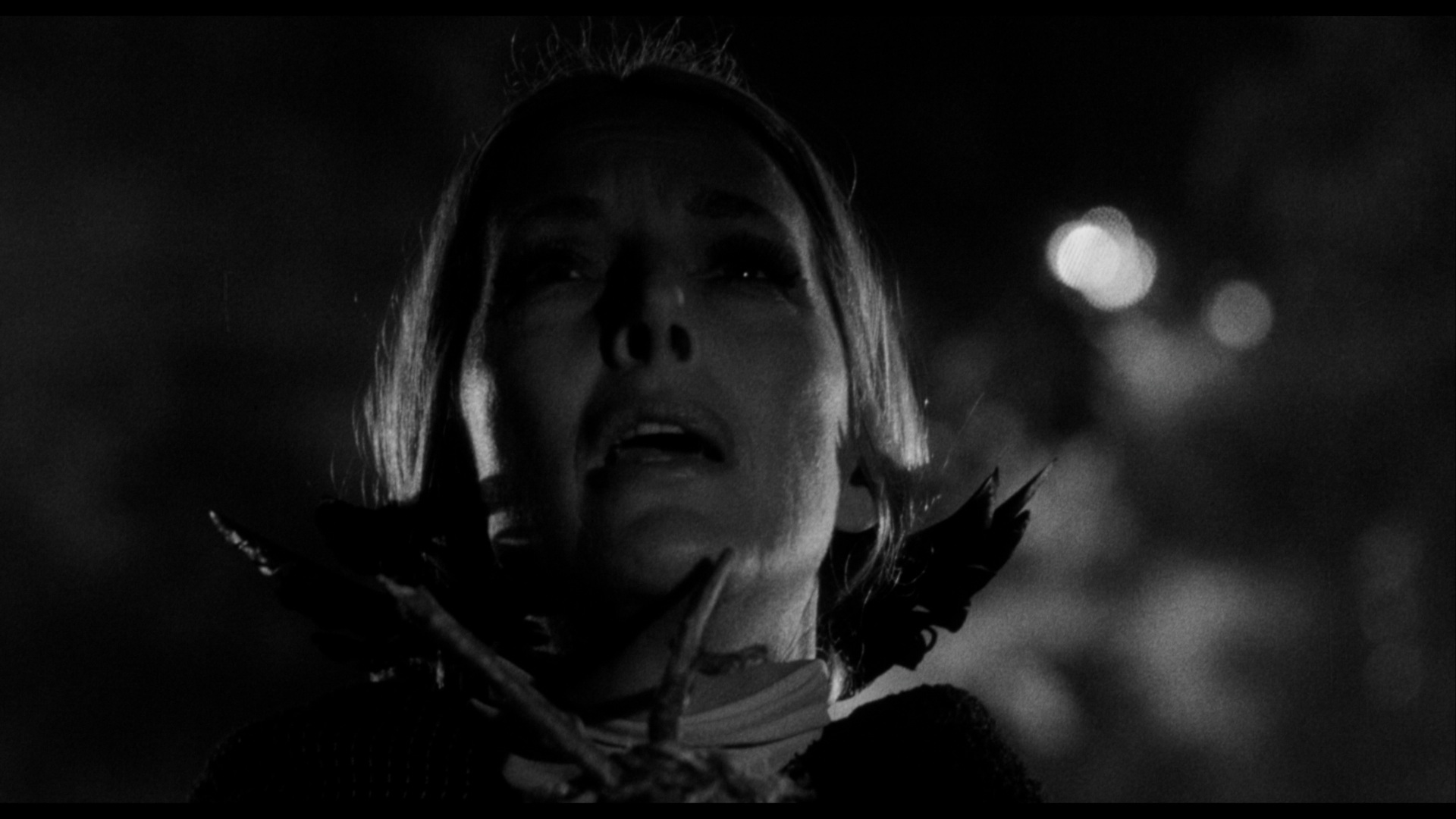 from the usual behind the scenes crew, including cinematography by the great Conrad Hall and a fascinating score from Dominic Frontiere. From the woodcut opening credits to the bizarre, demonic final scene, Incubus easily stands alone from any of its contemporaries and certainly deserved to be rescued from oblivion.
from the usual behind the scenes crew, including cinematography by the great Conrad Hall and a fascinating score from Dominic Frontiere. From the woodcut opening credits to the bizarre, demonic final scene, Incubus easily stands alone from any of its contemporaries and certainly deserved to be rescued from oblivion.
Considered lost after receiving only minimal theatrical screenings (including a small theatrical release in France), Incubus was first resuscitated with the discovery of a French-subtitled 16mm film print in the latter half of the 1990s which was used as the source for a 2001 DVD release (with optional English subtitles with large black bars laid over the French ones). Image quality looked fine at the time. Extras include a video interview by David Schow with Hall, William Fraker, and producer Anthony Taylor (19m15s); the men also provide a running commentary track in which they discuss the threadbare production, with Shatner providing his own separate commentary to discuss everything from the rigors of acting in an unfamiliar language to the challenges of evoking the supernatural on screen. Less valuable are "Curse of the Incubus," an Exorcist-style catalog of tragic events which befell the cast and crew, and a "trailer" which is actually a new, 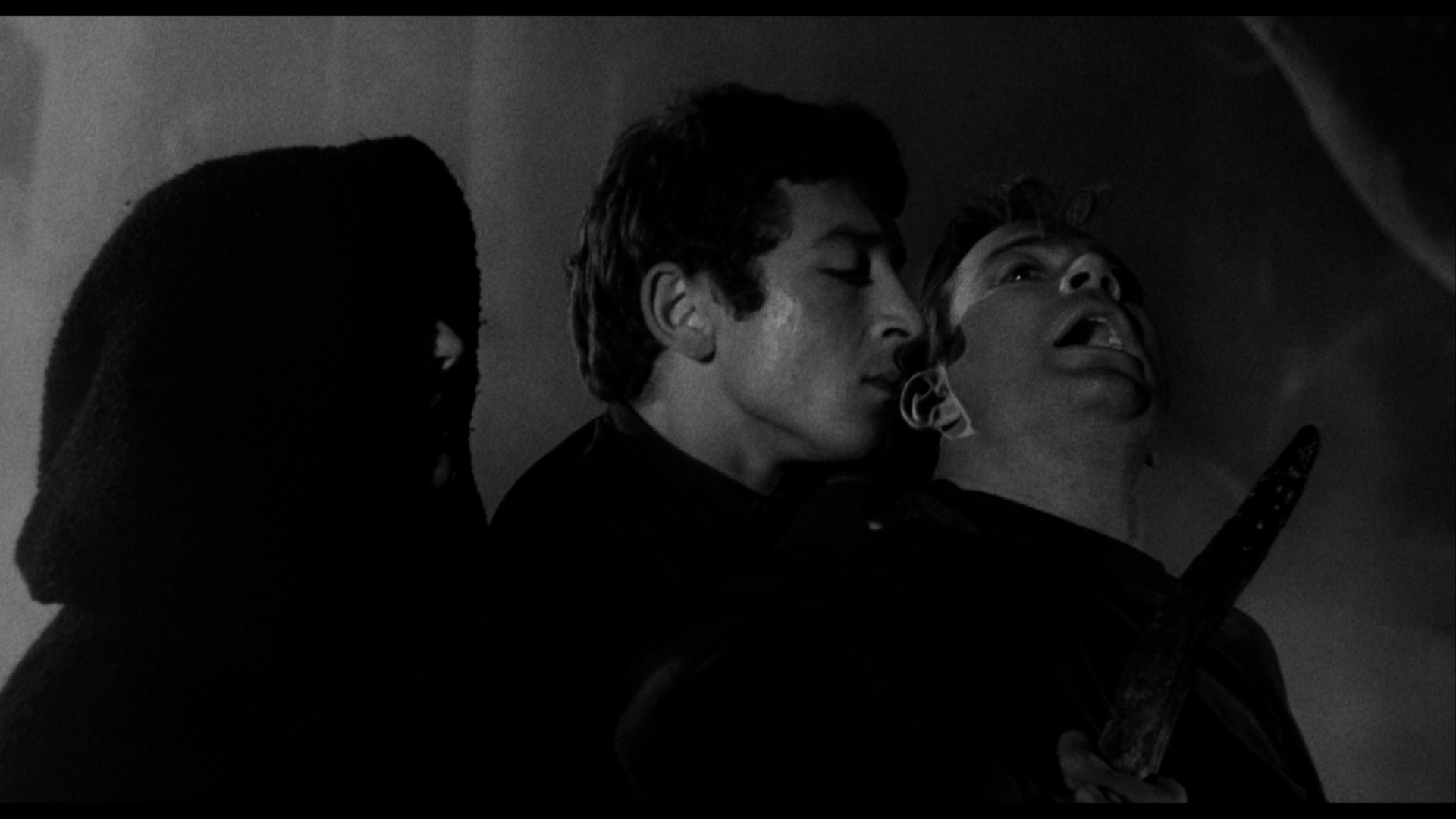 surprisingly
surprisingly 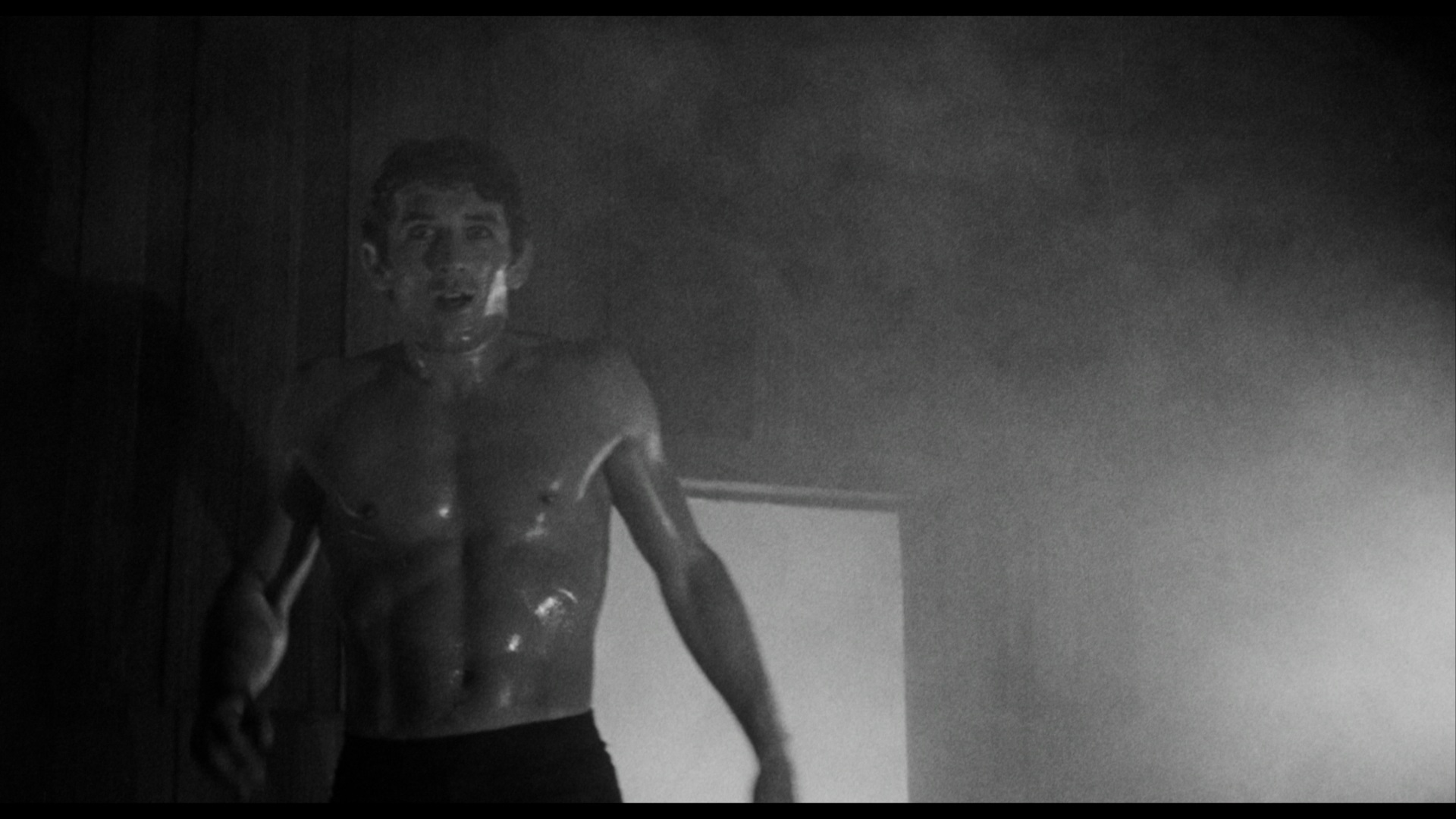 condescending commercial hawking the VHS release.
condescending commercial hawking the VHS release.
In 2024, French label Le Chat Qui Fume bowed a surprising 4K UHD/Blu-ray limited combo release along with an unlimited standalone Blu-ray edition, both sourced from an immaculate and highly impressive new scan of a superior 35mm print. The film can be watched in a matted 1.85:1 version (which obviously crops out the burned-in French subs on this source as well) or an unmatted 1.33:1 version, the latter only in HD and without English subs. The HDR-compatible Dolby Vision o the UHD makes it the better option, though this was limited to 1,000 copies and went out of circulation very quickly. The one extra is "The Cursed Film" (10m19s), a new breakdown of the project's insanely unfortunate history including its difficulty finding a distributor, the reception among Esperanto speakers, the murder-suicide fate of Milos Milos, and the eventual rediscovery.
In 2025, Arrow Video brought out its own limited edition UHD and Blu-ray options in the U.S. and U.K., taken from the same excellent restoration presented once again in Dolby Vision-compatible HDR on the UHD and the 1.33:1 version in HD on either format. Here you get English subtitles for either transfer (with LPCM 1.0 mono audio), and in a nice touch 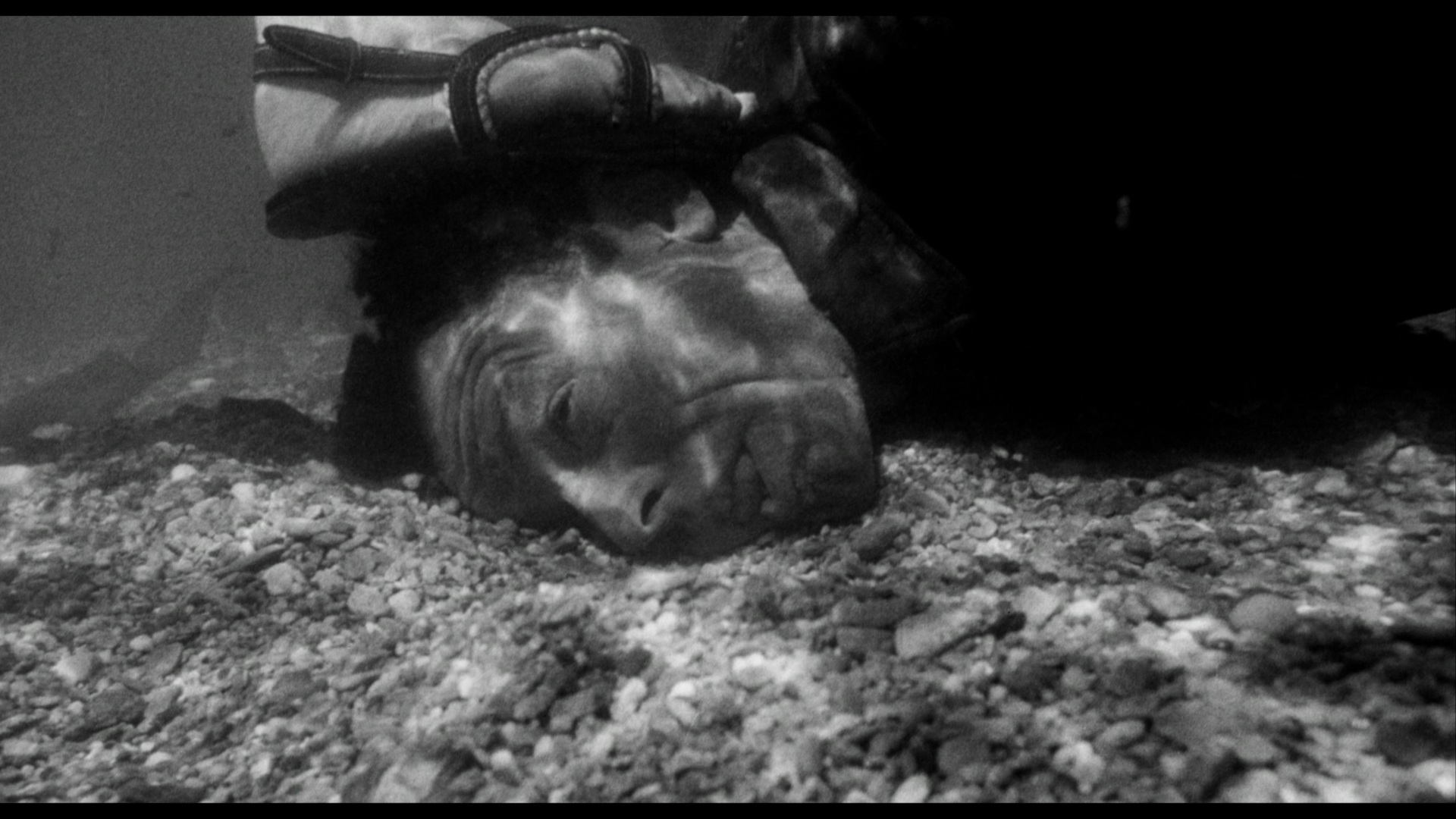 that may be a home video first, Esperanto SDH subtitles to boot. In another welcome gesture, the film comes with an isolated score reconstruction created by musician Jason Kruppa, a great way to enjoy Frontiere's work on its own. Both of the
that may be a home video first, Esperanto SDH subtitles to boot. In another welcome gesture, the film comes with an isolated score reconstruction created by musician Jason Kruppa, a great way to enjoy Frontiere's work on its own. Both of the 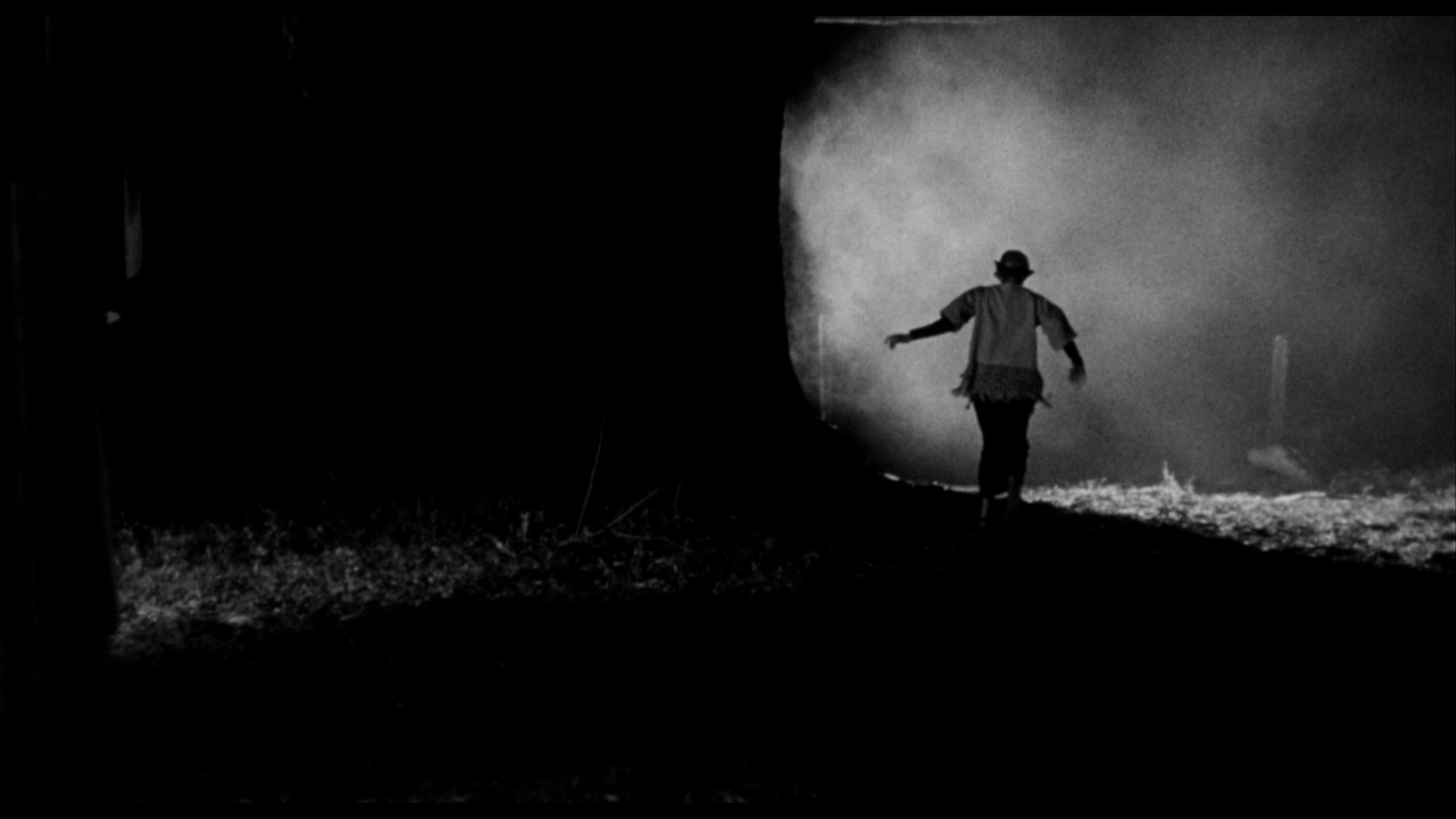 2001 commentaries are ported over here, while Schow delivers a very thorough new one laying out the whole history of the film in the wake of The Outer Limits, the early days of Shatner's career on the cusp of becoming Captain Kirk, and the many significant players in the production as well as its tangled history after completion. The trailer and archival interview featurette are here as well, while the new "Words and Worlds: Incubus and Esperanto in Cinema" (43m20s) is a new featurette with Stephen Bissette about the history of Esperanto, the odd fascination the rare references to this film held as a child, the peculiar appearances of Esperanto in pop culture for decades leading up to this film (including a connection to Dr. Mabuse and a later role in Gattaca), and lots of other astonishing detours that sometimes tie in with this film including more about the Milos Milos scandal. Finally in "Internacia Lingvo: A History of Esperanto" (22m5s), Esther Schor, author of Bridge of Words: Esperanto and the Dream of a Universal Language, focuses entirely on the history and permutations of the language itself including its devotees, the theory behind its creation, and the utopian idea behind having its usage creating a cultural unity around the world including its presence in music and literature. The limited edition also comes with an illustrated booklet featuring essays by Kruppa and Frank Collins.
2001 commentaries are ported over here, while Schow delivers a very thorough new one laying out the whole history of the film in the wake of The Outer Limits, the early days of Shatner's career on the cusp of becoming Captain Kirk, and the many significant players in the production as well as its tangled history after completion. The trailer and archival interview featurette are here as well, while the new "Words and Worlds: Incubus and Esperanto in Cinema" (43m20s) is a new featurette with Stephen Bissette about the history of Esperanto, the odd fascination the rare references to this film held as a child, the peculiar appearances of Esperanto in pop culture for decades leading up to this film (including a connection to Dr. Mabuse and a later role in Gattaca), and lots of other astonishing detours that sometimes tie in with this film including more about the Milos Milos scandal. Finally in "Internacia Lingvo: A History of Esperanto" (22m5s), Esther Schor, author of Bridge of Words: Esperanto and the Dream of a Universal Language, focuses entirely on the history and permutations of the language itself including its devotees, the theory behind its creation, and the utopian idea behind having its usage creating a cultural unity around the world including its presence in music and literature. The limited edition also comes with an illustrated booklet featuring essays by Kruppa and Frank Collins.
Updated review on February 25, 2025
 Shatner acting in the unsuccessful, fabricated "international" language of Esperanto sounds like the makings of a kitsch
Shatner acting in the unsuccessful, fabricated "international" language of Esperanto sounds like the makings of a kitsch  classic, Incubus is really anything but. This pet project of Outer Limits producer Leslie Stevens was rarely seen during its release and appeared to vanish entirely, existing more as a whispered about curio than a genuine film. The result, a sort of mythological mishmash of Horror Hotel and The Seventh Seal, is a strange and compelling experience that demands both imagination and patience from its viewers.
classic, Incubus is really anything but. This pet project of Outer Limits producer Leslie Stevens was rarely seen during its release and appeared to vanish entirely, existing more as a whispered about curio than a genuine film. The result, a sort of mythological mishmash of Horror Hotel and The Seventh Seal, is a strange and compelling experience that demands both imagination and patience from its viewers. sympathetic, with his usual scenery chewing inclinations held firmly in check here. Outer Limits fans in particular will enjoy contributions
sympathetic, with his usual scenery chewing inclinations held firmly in check here. Outer Limits fans in particular will enjoy contributions  from the usual behind the scenes crew, including cinematography by the great Conrad Hall and a fascinating score from Dominic Frontiere. From the woodcut opening credits to the bizarre, demonic final scene, Incubus easily stands alone from any of its contemporaries and certainly deserved to be rescued from oblivion.
from the usual behind the scenes crew, including cinematography by the great Conrad Hall and a fascinating score from Dominic Frontiere. From the woodcut opening credits to the bizarre, demonic final scene, Incubus easily stands alone from any of its contemporaries and certainly deserved to be rescued from oblivion.
 surprisingly
surprisingly  condescending commercial hawking the VHS release.
condescending commercial hawking the VHS release. that may be a home video first, Esperanto SDH subtitles to boot. In another welcome gesture, the film comes with an isolated score reconstruction created by musician Jason Kruppa, a great way to enjoy Frontiere's work on its own. Both of the
that may be a home video first, Esperanto SDH subtitles to boot. In another welcome gesture, the film comes with an isolated score reconstruction created by musician Jason Kruppa, a great way to enjoy Frontiere's work on its own. Both of the  2001 commentaries are ported over here, while Schow delivers a very thorough new one laying out the whole history of the film in the wake of The Outer Limits, the early days of Shatner's career on the cusp of becoming Captain Kirk, and the many significant players in the production as well as its tangled history after completion. The trailer and archival interview featurette are here as well, while the new "Words and Worlds: Incubus and Esperanto in Cinema" (43m20s) is a new featurette with Stephen Bissette about the history of Esperanto, the odd fascination the rare references to this film held as a child, the peculiar appearances of Esperanto in pop culture for decades leading up to this film (including a connection to Dr. Mabuse and a later role in Gattaca), and lots of other astonishing detours that sometimes tie in with this film including more about the Milos Milos scandal. Finally in "Internacia Lingvo: A History of Esperanto" (22m5s), Esther Schor, author of Bridge of Words: Esperanto and the Dream of a Universal Language, focuses entirely on the history and permutations of the language itself including its devotees, the theory behind its creation, and the utopian idea behind having its usage creating a cultural unity around the world including its presence in music and literature. The limited edition also comes with an illustrated booklet featuring essays by Kruppa and Frank Collins.
2001 commentaries are ported over here, while Schow delivers a very thorough new one laying out the whole history of the film in the wake of The Outer Limits, the early days of Shatner's career on the cusp of becoming Captain Kirk, and the many significant players in the production as well as its tangled history after completion. The trailer and archival interview featurette are here as well, while the new "Words and Worlds: Incubus and Esperanto in Cinema" (43m20s) is a new featurette with Stephen Bissette about the history of Esperanto, the odd fascination the rare references to this film held as a child, the peculiar appearances of Esperanto in pop culture for decades leading up to this film (including a connection to Dr. Mabuse and a later role in Gattaca), and lots of other astonishing detours that sometimes tie in with this film including more about the Milos Milos scandal. Finally in "Internacia Lingvo: A History of Esperanto" (22m5s), Esther Schor, author of Bridge of Words: Esperanto and the Dream of a Universal Language, focuses entirely on the history and permutations of the language itself including its devotees, the theory behind its creation, and the utopian idea behind having its usage creating a cultural unity around the world including its presence in music and literature. The limited edition also comes with an illustrated booklet featuring essays by Kruppa and Frank Collins. ![]()